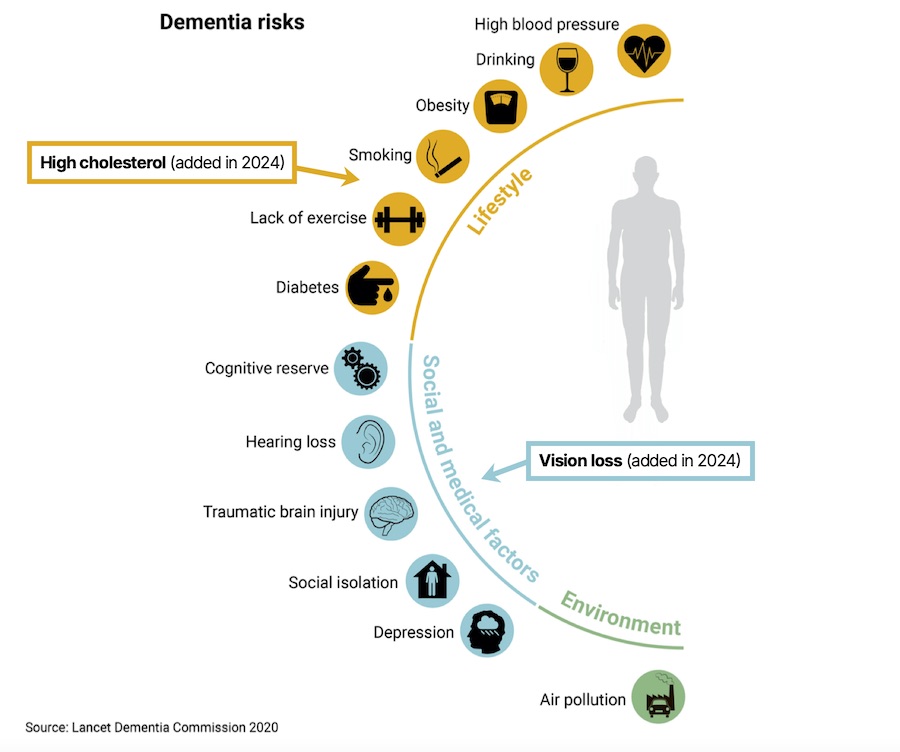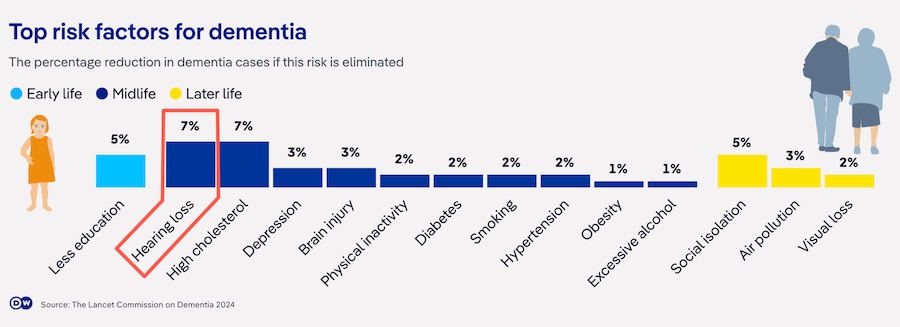New research suggests that lifestyle changes could prevent nearly half of dementia cases. The Lancet Commission on Dementia report, released at the Alzheimer's Association International Conference on July 28–29 in Philadelphia, outlined 14 modifiable risk factors contributing to dementia.
Why it matters
This study challenges the notion that dementia is inevitable. motivating people to reduce their risk, even with a genetic predisposition.
“There’s a big opportunity here because the world has changed in the last ten years when it comes to dementia science, but I don’t think our health system has caught up. At the moment we are trying to treat and support people at the very end stages of this condition, often when they are at crisis point. We need to rethink this — and I think prevention is key.” —Hilary Evans-Newton, chief executive of Alzheimer’s Research UK

The big picture
The Lancet Commission on Dementia builds on previous research, expanding from 12 to 14 modifiable risk factors. These include:
Lifestyle:
- High blood pressure,
- Excessive alcohol
- Obesity
- Smoking and
- Lack of exercise
- Diabetes
- High cholesterol (added in 2024)
Social and medical factors:
- Cognitive reserve
- Hearing loss
- Brain injury
- Social Isolation
- Depression
- Vision loss (added in 2024)
Environmental:
- Air pollution
By the numbers
- 40% of dementia cases could potentially be delayed or prevented
- High blood pressure increases the risk by 60%
- Social isolation raises the risk by 60%
- Depression increases the risk by 90%

A closer look
The study also emphasizes the importance of "cognitive reserve," meaning that keeping your brain active and engaged throughout life can build resilience against dementia. This means pursuing intellectual hobbies, challenging yourself with new skills, and staying socially connected.
The Commission advocated that governments and people adopt the following guidance to reduce dementia risk throughout life.
- Provide all children with good quality education and be cognitively active in midlife.
- Make hearing aids available for hearing loss and reduce harmful noise exposure.
- Detect and treat high LDL cholesterol in midlife from around age 40 years.
- Make screening and treatment for vision impairment accessible for all.
- Treat depression effectively.
- Wear helmets and head protection in contact sports and on bikes.
- Prioritize supportive community environments and housing to increase social contact.
- Reduce exposure to air pollution through strict clean air policies.
- Expand measures such as price control, raising the minimum purchase age, and smoking bans to reduce smoking.
- Reduce sugar and salt content in food sold in stores and restaurants.
The takeaway
While genetics plays a role, you can significantly reduce your dementia risk by doing the following:
- Maintaining a healthy diet and weight
- Staying physically active
- Engaging in mentally stimulating activities
- Managing cardiovascular health
- Staying socially connected
- Protecting against head injuries
- Treating hearing loss with hearing aids
Treating hearing loss, a proven way to reduce your risk of dementia
★ Call 708-599-9500 to schedule a free, 15-minute hearing screening by an audiologist.
★ For facts about hearing loss and hearing aid options, download The Hearing Loss Guide.
★ Sign up for our newsletter for the latest on Hearing aids, dementia triggered by hearing loss, pediatric speech and hearing, speech-language therapies, Parkinson's Voice therapies, and occupational-hearing conservation. We publish our newsletter eight times a year.
Don't let untreated hearing increase your risk of dementia.
Crest Hill, IL - 630-633-5060 | Palos Hills, IL - 708-599-9500

